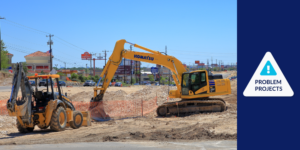
As a Pennsylvania interstate construction project continues to be beset by delays and cost overruns, State Senator Kristin Phillips-Hill brought a bill to the legislature on May 11, 2021, that would seek to curb “change order scheming” in future Pennsylvania highway construction projects.
Maryland-based Cherry Hill Construction, Inc. — a subsidiary of Tutor Perini Corporation — was originally awarded the contract on April 20, 2015, to widen and rework 1.3 miles of Interstate 83 and rebuild an exit onto Mount Rose Avenue in Pennsylvania’s York County. The project additionally required newly reconfigured ramps to eliminate certain turns on the interstate.
While the project’s original completion date was in 2018, the Pennsylvania Department of Transportation and Cherry Hill have had to push the completion date back multiple times.
Most recently, Pennsylvania Transportation Secretary Yassmin Gramian claimed in April 2021 that the project was due for completion on May 11, 2021 — a date that came and went with “significant” work left to be done on the project.
“I get it. We all have projects in our districts that are a few weeks behind. Maybe a month or two behind. Maybe a year behind. Not this project. This project is three years behind schedule and millions over budget.”
Pennsylvania State Senator Kristin Phillips-Hill
Additionally, there is frustration over the price of construction. The Mount Rose project was initially quoted at $58.3 million — but, based on reports from October 2020, the project’s costs now exceed $62 million. By February 2020, Cherry Hill had also been fined more than $7 million by the state for its delays.
In comments made to the Pennsylvania State Senate on May 12, 2021, Phillips-Hill (who represents York County) noted that the project was “not anywhere near completion.”
“We have another several months yet to go,” Phillips-Hall added. “I get it. We all have projects in our districts that are a few weeks behind. Maybe a month or two behind. Maybe a year behind. Not this project. This project is three years behind schedule and millions over budget.”
As delays and rising costs frustrate lawmakers, focus turns to contractor’s “scheming”
As Phillips-Hill claims, the project’s delays and cost overruns are allegedly the direct results of “change order scheming”:
“A company will come in, bring in a very low bid, undercut all the other bidders, and then on the back end, put in change orders that actually cause the total cost of that project to go way higher,” Phillips-Hill explains.
According to a memo sent to senate members by Phillips-Hill on May 11, 2021, state procurement codes require the Pennsylvania Department of Transportation to award contracts to a project’s “lowest possible bidder.”
However, as the memo continues to assert, simply being a project’s lowest bidder may not guarantee that a project’s costs will remain as such: “While [Cherry Hill Construction] was in fact the lowest bidder, [parent company Tutor Perini] has a well-documented history of ‘change order scheming’ where the company adds on costs to infrastructure projects over the duration of the construction timeline,” the memo states.
The proposed legislation would require the Pennsylvania Department of Transportation to consider any documented instances of the so-called “change order scheming” when judging bids for state projects.
Phillips-Hill added that “…sometimes the true cost of a project will far exceed the initial bid through these deceptive practices. Furthermore, this practice leads to years of delay, frustrating the people of Pennsylvania even more.”
“The people of York County have every right to be frustrated,” Phillips-Hill continued. “If this was a contractor putting in a new bathroom at your home, you would never tolerate a construction crew doubling the time frame and adding 10 percent of costs to the project you were initially quoted. This project needs to be completed and moving forward, we should not do business with entities that have a track record of doing what we have all witnessed over the last six years.”
However, a March 23, 2020, statement by Cherry Hill Construction’s representative, C. Grainger Bowman, rejected allegations of the company’s “change order scheming.”
Instead, the company sought to blame the Pennsylvania Department of Transportation for what Bowman claimed were its own errors of design for the project — alleging that the department knew back in December 2015 that the project would have to be delayed.
The statement further noted that Cherry Hill and its subcontractors had lost “hundreds of millions of dollars” over the project, necessitating their claim of $24 million in change orders.
Tutor Perin faced multiple past issues with change orders
Though Phillips-Hill’s proposed legislation would be focused on protecting Pennsylvania from any future inflated construction projects, Tutor Perini has a reputation for manipulating its income through change orders that extends decades.
A 1992 comment by then-mayor of Los Angeles Tom Bradley claimed that Ron Tutor, owner of what is now Tutor Perini, was “the greatest change-order artist [Bradley had] ever seen. He submits the low bid then makes it up on the change orders.”
The company has also been hit by accusations that Tutor has attempted to influence political officials who have approved Tutor Perini’s work. Tutor Perini’s predecessor company, Tutor Saliba, was involved with two major controversies in the 1990s and 2000s in which city officials provided the company with lucrative contracts or change orders after Tutor and his employees gave them significant campaign contributions.
A 2002 lawsuit by San Francisco City Attorney Dennis Herrera alleged that Tutor Saliba “artificially inflated” its change orders, bringing a project’s cost from $626 million to $980 million.
Similarly, an August 2012 report by the San Diego Union Tribune’s Center for Investigative Reporting pointed out that 11 major projects helmed by Tutor Saliba and Tutor Perini from 2000 to 2012 in California ended up costing local governments $765 million over the value of initial bids.
A 2003 study by Oxford University professor Bent Flyvbjerg noted that some cost overruns are common in public works construction worldwide.
According to the findings, public rail projects went over budget by an average of 45%, bridges and tunnels by an average of 34%, and roads by an average of 20%. However, the 11 California projects investigated by the Center for Investigative Reporting had overruns which raised up to 107% of the initial bid.
In its responses, Tutor Perini has been defiant of the charges, with CEO Ron Tutor maintaining that blame should be focused away from his company.
“There is this bias that it must be the contractor,” Ron Tutor said. “They never look to see what’s behind the increases, and 90 percent of the time, it’s the owners adding to the work.”
